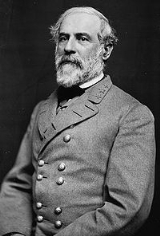
in the American Civil War
.
The son of Revolutionary War
officer Henry "Light Horse Harry" Lee III and a top graduate of the United States Military Academy
, Robert E. Lee distinguished himself as an exceptional officer and combat engineer in the United States Army
for 32 years. During this time, he served throughout the United States, distinguished himself during the Mexican-American War, served as Superintendent of the United States Military Academy, and married Mary Custis
.
When Virginia declared its secession from the Union
in April 1861, Lee chose to follow his home state, despite his personal desire for the Union to stay intact and despite the fact that President Abraham Lincoln
had offered Lee command of the Union Army
.
1861 American Civil War: Robert E. Lee resigns his commission in the United States Army in order to command the forces of the state of Virginia.
1862 Civil War Maryland Campaign: General Robert E. Lee takes the Army of Northern Virginia, and the war, into the North.
1862 American Civil War: Union soldiers find a copy of Robert E. Lee's battle plans in a field outside Frederick, Maryland. It is the prelude to the Battle of Antietam.
1862 American Civil War: George B. McClellan halts the northward drive of Robert E. Lee's Confederate army in the single-day Battle of Antietam, the bloodiest day in American history.
1862 American Civil War: At the Battle of Fredericksburg, Confederate General Robert E. Lee defeats the Union Major General Ambrose E. Burnside.
1863 American Civil War: following his defeat in the Battle of Gettysburg, General Robert E. Lee sends a letter of resignation to Confederate President Jefferson Davis (which is refused upon receipt).
1864 Arlington National Cemetery is established when {{convert|200|acre|km²}} around Arlington Mansion (formerly owned by Confederate General Robert E. Lee) are officially set aside as a military cemetery by U.S. Secretary of War Edwin M. Stanton.
1865 American Civil War: The Siege of Petersburg is broken – Union troops capture the trenches around Petersburg, Virginia, forcing Confederate General Robert E. Lee to retreat.
1865 American Civil War: Robert E. Lee surrenders the Army of Northern Virginia (26,765 troops) to Ulysses S. Grant at Appomattox Courthouse, Virginia, effectively ending the war.
1865 American Civil War: A day after his surrender to Union forces, Confederate General Robert E. Lee addresses his troops for the last time.
Duty is the sublimest word in our language. Do your duty in all things. You cannot do more. You should never wish to do less.![]()
It is well that war is so terrible, otherwise we should grow too fond of it.![]()
I have been up to see the Congress and they do not seem to be able to do anything except to eat peanuts and chew tobacco, while my army is starving.![]()
True patriotism sometimes requires of men to act exactly contrary, at one period, to that which it does at another, and the motive which impels them — the desire to do right — is precisely the same.![]()

